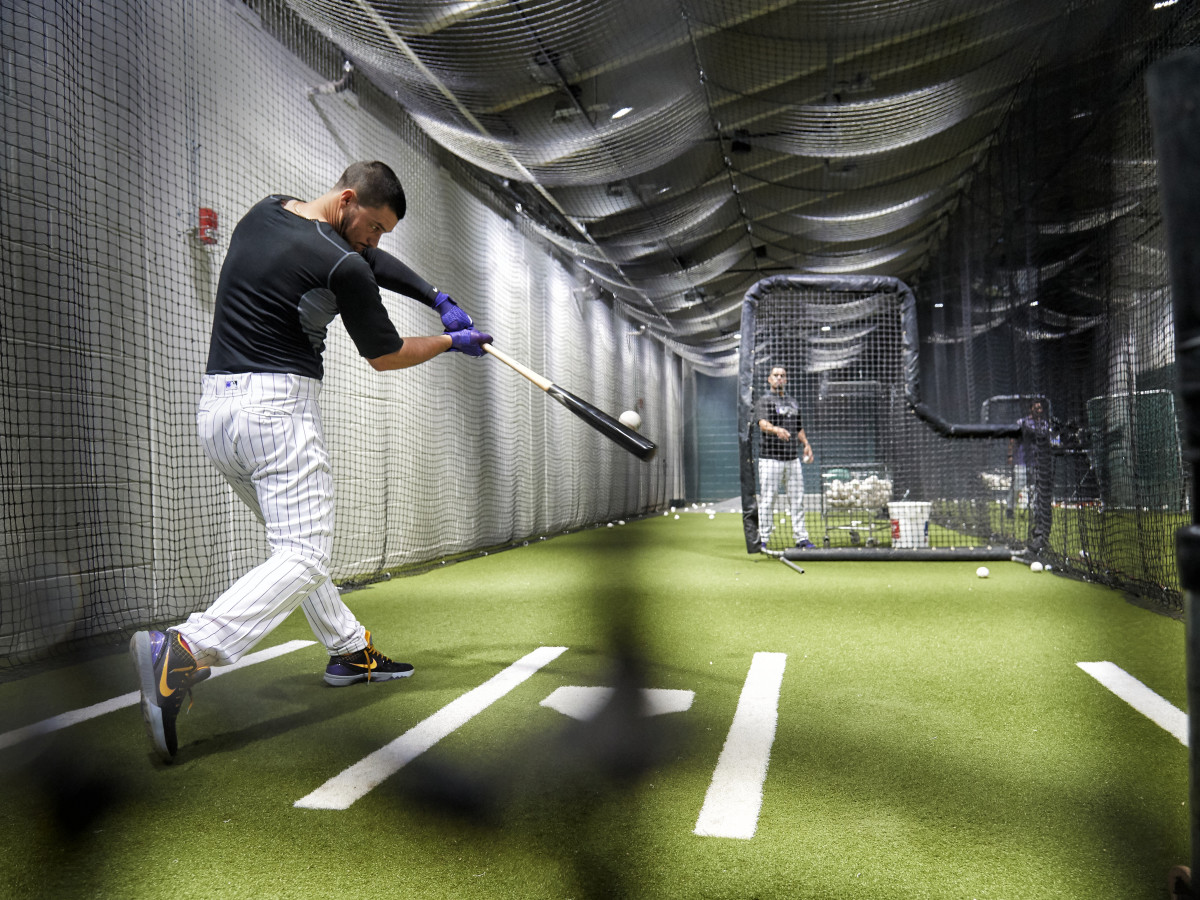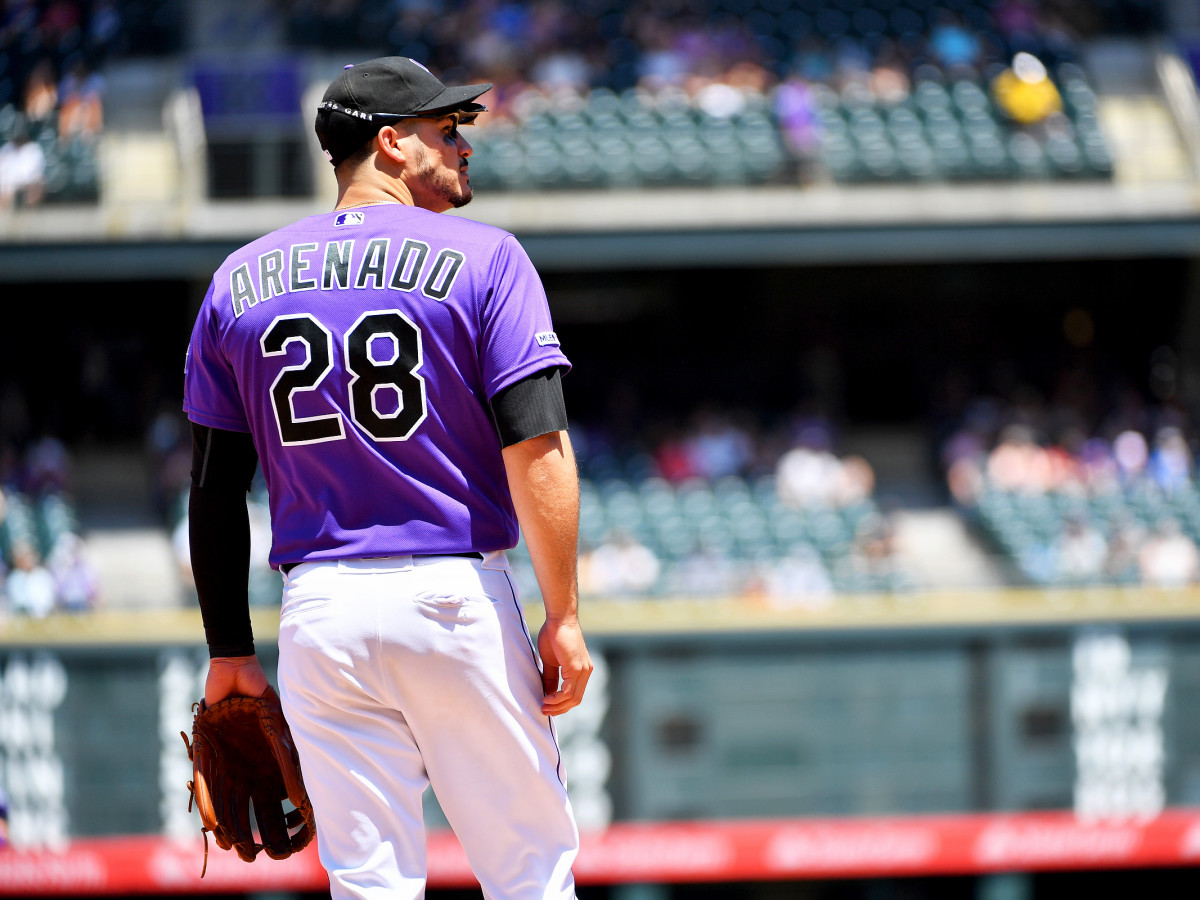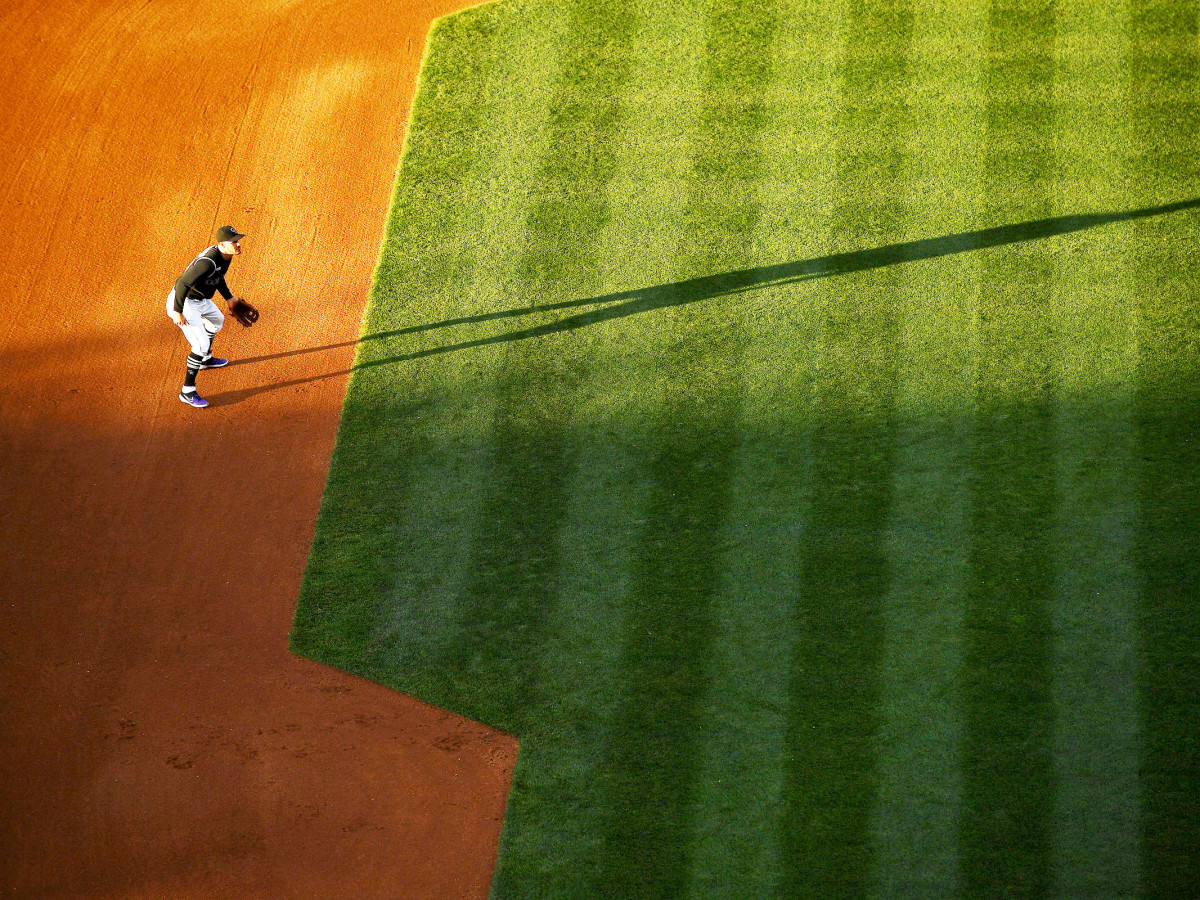Nolan Arenado's Low-Key Persona Fuels His Stardom

This story appears in the July 29, 2019, issue of Sports Illustrated. For more great storytelling and in-depth analysis, subscribe to the magazine—and get up to 94% off the cover price. Click here for more.
On Feb. 27, Nolan Arenado went missing. He arrived at the Rockies' complex at 7:20 a.m. He agreed to an eight-year, $260 million extension. He hit in the cage and spoke at his press conference. Then he disappeared. GM Jeff Bridich stalked the halls, asking everyone, "Have you seen Nolan?" Video coordinators scanned feeds from around the facility. Staffers fanned out across the grounds. Finally Arenado's agent, Joel Wolfe, located him on Field 2, hitting off the curveball machine. Wolfe was shaking his head.
Arenado had only verbally agreed to the contract. He had neglected to sign it. Telling the story now, Colorado centerfielder Charlie Blackmon laughs. If he woke up in line for a quarter-billion dollars, he says, "that's probably No. 1 on my list of things to do, to sign that piece of paper, but not for Nolan."
Four months and one day later, I meet Arenado, wearing a white T-shirt and track pants, at 12:45 p.m. outside his Denver apartment building. I am here to learn something—anything—about him. Since his 2013 debut, Arenado has been the game's fifth-most-valuable player, with 36.1 WAR. At just 28, he has a chance to be the best third baseman ever. That's essentially all I know, though, and he'd prefer that it stay that way. "I really didn't want to do this," he says. He's not even sure he ever officially agreed to grant me this interview.
It takes less than five minutes for him to bring up the panic attacks he sometimes gets in public, as an explanation for avoiding attention. A couple of years ago he was at a nearby mall to buy a pair of Nikes, and a few people recognized him. The group grew into a mob. He started sweating. I gotta get out of here. Then he realized he had misplaced his keys. As he retraced his steps, the crowd mushroomed. Finally he got back to Hugo Boss, where salespeople had the keys. They recognized him, too. "I've been online shopping ever since," he says.
Early in his career, he would drive through downtown and slow to a crawl. Through tinted windows, he would watch the swarms outside bars on Blake Street. He would imagine joining them. Then he would remember the autographs, the photos. He would hit the gas and head home.
When asked why he isn’t more famous, his teammates cite Denver’s market size. But Arenado knows the truth: He is desperate for anonymity. Other than a throwaway Twitter profile he uses to keep abreast of news, his last social media account was AOL Instant Messenger. As a perennial MVP candidate for the Rockies, he could surely receive free tickets to the Broncos, Nuggets and Avalanche. He usually declines because he doesn’t want to appear on the jumbotron. Arenado is handsome, all sharp features and dark eyes. But the idea of modeling, the way Cubs third baseman Kris Bryant does for Express, horrifies him.
Today, Arenado stops by Starbucks for a venti vanilla sweet cream cold brew. (He gave up dairy in the offseason at the suggestion of friends Matt Holliday and Chase Utley, but he indulges on occasion.) Arenado has already eaten; at 10:45 his private chef served eggs, turkey sausage and bacon, plus an acai bowl and coffee. Then Arenado watched Braveheart in advance of his nightmare: 11½ hours with a reporter.
The timing is not ideal. The Rockies visited Los Angeles in late June and got swept—making it 11 consecutive losses to the Dodgers, dating to 2018. Arenado next went 1 for 10 in a series win over the Giants in the following days, and he was 0 for 4 at Coors Field as the Dodgers won another game against Colorado. He is miserable. All he can think is: 12 straight. They shouldn't have put me in the lineup today, he thought as he drove home. I contributed nothing.
Arenado claims he has gotten better at putting bad days behind him. The people around him disagree. "Yesterday's story would have been easy," says assistant athletic trainer Scott Gehret. "Woke up, ate, was grouchy. Took BP, was grouchy. Went 0 for 4, was pissed, went home. Nice article."

At 1:32 p.m., Arenado enters the weight room. A few times each week he lifts after games, but before games he just warms up. Mostly this entails stretching and loosening his shoulders. Now he lies on one side holding a kettlebell above him and rotates his leg.
He moves to the video room and cues up footage of the day's starter, lefty Hyun-Jin Ryu. They have faced off 23 times, and Arenado has reached base in 14 of them. Video coordinator Brian Jones walks by just as Arenado homers on-screen. "Do that again," Jones suggests.
Arenado prefers to hit in the cage at 2, but today shortstop Trevor Story has reserved that slot, so he settles for 2:15. Few tend to their swings as assiduously as Arenado. At restaurants he'll rise from the table to take practice cuts. Infielder Garrett Hampson once watched Arenado homer, then tweak his stroke upon his return to the dugout. "There are dry hacks in the elevator," Arenado confesses. "It's bad."
In the cage he stretches, applies pine tar to his bat and checks his phone. At 2:15, precisely, he pushes the netting aside and strides to the plate. He takes 13 cuts off a tee before bullpen catcher Aaron Muñoz begins flipping balls to him. He takes two one-handed swings, then eight proper ones. He frowns and adjusts his gloves. He feels he's lunging at the ball, so he resets the tee in front of him, to force himself to shorten his stride. After a dozen cuts, Muñoz removes it. Arenado hits another 10 balls, then smiles.
At lunch, he orders a steak-and-pork-belly sandwich from team chef Tyler Hines and reminisces about the 2017 All-Star Game in Miami. He attached himself to Dodgers lefty Clayton Kershaw, whom the Rockies will face tomorrow. Arenado had long admired Kershaw's work ethic, so he followed him to the weight room and watched "like a weirdo," he says. Away from the park, Arenado watches a lot of baseball (with surfing movies and The Office reruns sprinkled in). He can't get enough. (He will later say, unprompted, "You want to know the last time I read books? Holes, in high school, and Juiced, by Jose Canseco. I read that in the minor leagues.") He used to drive coaches nuts by taking BP at Coors on off days. This year, he has limited the extra sessions to a handful. He considers this personal growth.

Following lunch, Arenado takes the field under an oppressive sun. He stretches, plays catch. Then comes batting practice. Most players hit for three or four rounds, eight swings per round. Arenado goes for eight—giving him over 100 cuts already on the day, not counting those elevator hacks. He pelts the outfield fences.
Next is infield practice. Arenado has won a Gold Glove in each of his six seasons. When drafted in the second round out of El Toro High in Lake Forest, Calif., though, he was a poor defender. Blackmon recalls his disappointment upon first seeing his new teammate in 2009: "He had cankles. I was like, I don't see it. This guy's gonna have to move to first because of his big, fat, slow feet, and he's not gonna have enough power."
Rockies roving minor league infield coach Scott Fletcher spent hours with Arenado, preaching low to high: Start with your glove touching the dirt. Wait ... wait for it ... and only when the ball is close can you begin scooping. Arenado says it's the most important lesson he's ever gotten. He would like to be a minor league infield rover someday, he thinks, earning $50,000 to stand on dusty fields, teaching teenagers to stay low.
He takes grounders, throwing to first, then to second, and then to first again. But he's off-target. "One more," he calls.
First baseman Mark Reynolds has to reach for the next one.
"One more." "One more." "One more."
The last one is hardly better, but Arenado is worried about overtaxing his legs. He is still frustrated as he walks past the batting cage. Just a few more swings, he thinks. But he remembers he gave his batting gloves to a young fan. He decides he has hit enough. More growth.

Arenado's mood is dark after the Dodgers score three runs in the top of the first. As he reaches the plate in the bottom of the inning, a bug flies into his eye. "That's good," Reynolds will tell him, back in the dugout. "It gave you time to get your head out of your ass."
Facing a 3–2 pitch with a man on, Arenado tells himself not to try to do too much. See the ball and hit it hard. Ryu throws a waist-high fastball in. Arenado lines it over the leftfield fence. He points skyward, a nod to his faith, as he crosses home.
On defense, he sets up halfway to second base when lefties Joc Pederson and Cody Bellinger come to bat. Arenado mostly lets infield coach Stu Cole position him. Some fielders like to use positioning cards, but Arenado discarded his this May. He trusts the coaches to shift him, and he trusts himself to make the plays. Both hitters send balls directly to perfectly located fielders.
Entering the bottom of the fourth, L.A. is up 5–2. Arenado leads off. Be ready to hit, he tells himself. The first pitch is an 87-mph cutter. He bashes a double off the centerfield wall.
Ryu tires in the fifth, and suddenly the Rockies lead 7-5. Righty Joe Kelly enters for L.A. Stay inside, Arenado thinks. Don't try to come around on it, because you might roll it over. He has a good sinker, and he throws it 99. Let him produce the power. The first pitch is a 98-mph sinker inside. The second is at 99 above his knees. Arenado blasts it to right center and cruises into second.
Although my main contribution for the day has been to inform him that Sports Illustrated and ESPN are not different branches of the same company—“Oh, sorry,” he says. “I don’t watch SportsCenter. Does that help?”—his teammates decide that the only difference between last night and tonight is my presence. Once he returns to the dugout, they suggest he hire me, maybe as an interpreter, though he doesn't need one. Arenado's father is Cuban and his mother is Puerto Rican, but he speaks no Spanish. His Hispanic teammates call him Mickey Mouse, he says, "'cause he's a fake mouse and I'm a fake Latino." (I spend the game in the press box. The Rockies fill me in on the dugout banter later.)
In the sixth, up 10-8, Arenado faces righthander Zac Rosscup. Arenado fouls the sixth pitch off his left big toe. The digit was already sore from a foul ball last week. Manager Bud Black and the trainers burst from the dugout. Arenado says he's fine, but they mill around to let him breathe. The next pitch is a slider, below the zone; Arenado rolls it over, but the ball caroms off the third base bag, and even though it lands in Justin Turner's hand, Arenado beats the throw—a four-hit night.

The game is delayed in the seventh as a thunderstorm rolls through. Fans are asked to flee the upper deck. The Rockies remain in their dugout, playing games of Would You Rather? and hoping the rain lasts long enough to end the game. Hampson and second baseman Ryan McMahon have one for Arenado: Would you rather go 3 for 4 without hitting a foul ball off your foot, or go 4 for 4 but you break your toe?
Arenado laughs. "I'll take the 4 for 4."
The game resumes after a 19-minute pause. L.A. adds a run in the top of the eighth. Arenado faces righty J.T. Chargois with the bases loaded and none out. He strikes out looking on a slider that he thinks is low, and hopes it won't cost the team the game. It does not: The Rockies win 13-9. Once I reach the clubhouse, Arenado is beaming. "You live with me now," he says. "You're never leaving."
Later, in the training room, strapped into the NormaTec recovery pants he uses after every game, he discusses the Coors effect. Counting the delay, the game lasted three hours and 50 minutes. The teams combined for five home runs, four errors and 93 trips to the plate. Arenado calls the evening a "debacle" and "the most Coors game of all time."
If he hadn’t signed the extension, he would have hit free agency after this season. He fully intended to test the market. But this winter, after the Rockies made a reasonable opening bid, he asked himself why he might leave. He realized he hated hearing how his accomplishments are tainted by his home ballpark.
“I see the numbers,” he says. “I’m not blind to it.” He has hit .324 with a .612 slugging percentage at home for his career. Those numbers are .262 and .471 on the road. At Coors, Arenado hits like Manny Ramirez. Everywhere else, he’s Johnny Damon.
But the numbers remove all context, Arenado says. That thin air has downsides, too. Long games mean more time standing on the field. Slugfests mean that no one can relax, because no game is ever over. And then there are the physical adjustments. Everything is different at a mile above sea level: recovery time, movement of pitches, breathing. The Rockies wake up congested for the first few days of each homestand.
D.J. LeMahieu, who played second base for the Rockies until he signed with the Yankees this offseason, is one of Arenado’s best friends. Arenado asked recently about life outside of Coors, and LeMahieu gushed: It’s so much easier to prepare. I actually like playing on the road now, because it’s the same as at home.
Arenado decided he was looking at his legacy the wrong way. He didn’t need to prove to anyone that he could be great elsewhere. He decided to prove he could do it here.
He peels off the NormaTec, showers and heads for the car. At 11:50 p.m., he and Blackmon are the last two players at the ballpark. Blackmon has a friend in town, and they invite Arenado out for a drink. Arenado pauses to consider the offer. "No, dude," he says. "Kershaw."
